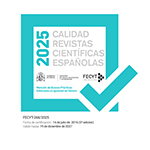Weapons forged by our rivals. Catholic mobilisation in the Liberal Age (1812-1874)
Abstract
This article outlines the history of the Spanish Catholic petition drives from 1812, when Catholic activist collected twenty thousand signatures against the abolition of the Inquisition, to 1869, when they gathered three million signatures opposing freedom of religion. This last campaign, albeit with some irregularities in the procuring of names, produced the most considerable amount of signatures to a petition of nineteenth-century Spain. The research is built upon newspapers, printed leaflets, records of parliamentary debates and parliamentary and Vatican archival collections. Contrary to other nineteenth-century drives, Spanish Catholic petitions usually accepted signatures of women and children, thus clashing with the virile understanding of citizenship embraced by the dominant liberal culture. By paying attention to this and other peculiarities, this article aims to reconstruct the cultural understandings that, in dialogue with the experiences of Catholics of other countries, the Spanish activists developed in order to make use of mass-signed petitions and addresses, a form of doing politics that many understood as belonging to the world of Jacobinism and liberalism. The main conclusion is that Catholic activism played a crucial role in the inscription of the social movement, here understood as a peculiar form of doing politics, into the political culture of nineteenth-century Spaniards.
Downloads
Article download
License
Aquellos autores/as que tengan publicaciones con esta revista, aceptan los términos siguientes:
a. Los autores/as conservarán sus derechos de autor y garantizarán a la revista el derecho de primera publicación de su obra, el cuál estará simultáneamente sujeto a la Licencia de reconocimiento de Creative Commons Reconocimiento-No comercial-Sin obra derivada 4.0 España que permite a terceros compartir la obra siempre que se indique su autor y su primera publicación esta revista.
b. Los autores/as podrán adoptar otros acuerdos de licencia no exclusiva de distribución de la versión de la obra publicada (p. ej.: depositarla en un archivo telemático institucional o publicarla en un volumen monográfico) siempre que se indique la publicación inicial en esta revista.
Plagio y fraude científico
La publicación de un trabajo que atente contra los derechos de propiedad intelectual será responsabilidad de los autores/as, que serán los que asuman los conflictos que pudieran tener lugar por razones de derechos de autor. Los conflictos más importantes pueden darse por la comisión de plagios y fraudes científicos.
Se entiende por plagio:
1.Presentar el trabajo ajeno como propio.
2.Adoptar palabras o ideas de otros autores sin el debido reconocimiento.
3.No emplear las comillas u otro formato distintivo en una cita literal.
4.Dar información incorrecta sobre la verdadera fuente de una cita.
5.El parafraseo de una fuente sin mencionar la fuente.
6.El parafraseo abusivo, incluso si se menciona la fuente.
Las prácticas constitutivas de fraude científico son las siguientes:
1.Fabricación, falsificación u omisión de datos y plagio.
2.Publicación duplicada.
3.Conflictos de autoría.












